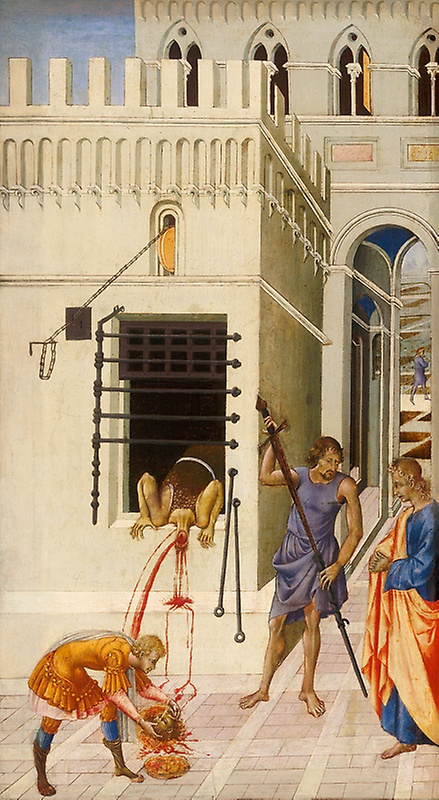I jotted this for the print edition of UK’s best Catholic weekly, the Catholic Herald. I give them 400 words (exactly) a week.
 I celebrate as my onomastico or “name day” the Feast of the Beheading of John the Baptist, 29 August. “He must increase,” said the Baptist, “I must decrease” (John 3:30). I need that rule of life. St Augustine of Hippo (d 430) connected John’s sudden, violent “decrease”, his head’s removal from his shoulders, with the autumnal shortening of daylight, while the feast of John’s birth coincided with the vernal lengthening of days.
I celebrate as my onomastico or “name day” the Feast of the Beheading of John the Baptist, 29 August. “He must increase,” said the Baptist, “I must decrease” (John 3:30). I need that rule of life. St Augustine of Hippo (d 430) connected John’s sudden, violent “decrease”, his head’s removal from his shoulders, with the autumnal shortening of daylight, while the feast of John’s birth coincided with the vernal lengthening of days.
Speaking of shoulders, as I write I am in the “City of Big Shoulders”, as poet Carl Sandburg described Chicago, in defiance of the world’s other great cities, like London, Rome, and Paris. As he explained it, “The poem sort of says, ‘Maybe we ain’t got culture, but we’re eatin’ regular.’” One of the things I regularly eat here is the indigenous hot dog. I’ve learned to order these like a native speaker by cordially growling, “drag it through da’ garden”, to make sure that all the necessary hot peppers, onions, tomatoes, celery salt and pickles are included. When they weren’t eatin’ so regular here, they loaded up the bun with veggies. What was once famine fare is now a feast.
Chicago has culture in addition to the hot dog. Not far from where I am, on the other side of the “Friendly Confines” of Wrigley Field (where the Cubs play The Game God Surely Loves Best) in the Art Institute of Chicago, there is a tempera on panel depiction of the Beheading of the Baptist by the Sienese painter Giovanni di Paolo (d 1482). You view the instant after the deed. Seen from outside the prison, John leans out of his window, guillotine like, his headless shoulders and angled arms still in place as a massive gout of blood jets forth the jutting neck. A servant with a platter stoops for his head. The executioner sheathes his man-length blade.
John was not only a martyr for the Truth. Miraculous son of the elderly priest Zechariah, he was a priestly martyr. John stood against Herod and his crony cadre of corrupted priests who backed his violation of the truth of sexuality and marriage. Herod used his power to sin. John’s blood exposed also priestly corruption in a way that no one could ignore. By the way, Herod’s command to kill John, the incorruptible priest, came from his lust for a child. Salome was a “little girl” (Greek korásion).


































Pingback: 29 August – Beheading of John the Baptist: exposing corrupt priests who covered Herod’s pedophile lust | Fr. Z’s BlogFr. Z’s Blog | Deaconjohn1987's Blog
Father Cyril focused on whether John had any idea of whether his fidelity to Christ made a difference to others. A just man will be remembered forever.
Plus ça change, plus c’est la même chose.
A moment of levity, a tribute to Chicago, while the good Father is there.
The late Steve Goodman penned “A Dying Cub Fan’s Last Request” to lament a disappointing history of a team a city loved to hate for many years. Four days after Goodman’s death in 1984, the Chicago Cubs clinched the Eastern Division title in the National League for the first time ever, earning them their first post-season appearance since 1945, three years before Goodman’s birth. Eight days later, on October 2, the Cubs played their first post-season game since the 1945 World Series.
His ashes were scattered over Wrigley Field. The rest, as they say, is history.
https://youtu.be/7xBxZGQ1dJk
If St. John the Baptist was alive today….
1. He would receive a phone call from the Chancery telling him to cease what he’s doing.
2. The Cardinal of his archdiocese would issue a statement to the press apologizing for the Baptist’s harsh language against adultery.
3. The Baptist would be placed on leave, or perhaps banished to Malta.
4. Herod and Herodias would be welcome to receive Communion as the Church “accompanies” them in their unique pastoral situation, because “who are we to judge?”
St. John the Baptist, pray for us.
Contrast the witness of martyrs who openly suffered and died for their great faith in the Church with the witness of shepherds who clandestinely reveled in their lecherous filth under the mantle of the Church.